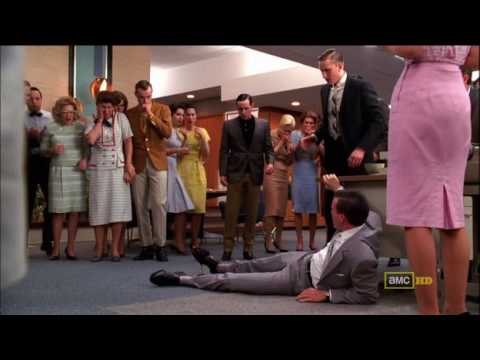Although I am finding Mad Men deals with numerous social issues, disability seems to be far out on the fringes. In a 2009 episode entitled “Guy Walks into An Advertising Agency,” disability enters the conversation toward the end of the episode.
An accident results in a lawnmower running over the foot of Guy MacKindrick, a British employee at Sterling Cooper. Once this scene closes, we find Joan Holloway (the office manager) and Don Draper (the creative director) standing in a hospital waiting room. It is made clear once the British executives of the company arrive that MacKindrick has lost his foot. In response to this, one executive replies, “He was a great account man. A prodigy. Could talk a Scotsman out of a penny. Now that’s over.” Another replies, “The man is missing a foot. How’s he going to work? He can’t walk.”
The language used here evokes the equation of bodily integrity and ability with productivity. Particularly so in the 20th century, the able body was aligned with the principle of the working, producing body. Ability, and in many sense citizenship, relied on one’s output. Immediately, at the sign of a lost foot, MacKindrick’s effective and productive body is rendered useless. His bosses identify him as incapable to work. In many ways, this immediate dismissal from his job, even though he is a “great account man,” speaks to the connections drawn in the 20th century between work and ability. There exists the capitalistic belief that MacKindrick’s value to the company, and I would argue, his value as a person, is dependent upon his able-bodiedness, and thus, what he produces. This privilege is starkly called into question when he no longer possesses an able body. His “defective” body signifies lack in the highly capitalistic environment of the ad agency.
The belief that one’s body and personhood depends on what, and how much, one produces still exists in today’s culture. The stigma surrounding people with disabilities that are on Social Security Income (S.S.I.) speaks to our culture of production, the belief that a productive American must hold a job to be a “meaningful” human being. This faulty, ableist logic attaches stereotypes of laziness, ineffectiveness, and being a malingerer to the body of a person with a disability, particularly one who is one S.S.I. Most ironic, it is not that MacKindrick can no longer be an ad man with a missing foot. He can; however the agency is equating the lost foot with deficiency. MacKindrick’s disability now represents his entire being.
Perhaps one central reason why Mad Men does not have more episodes focusing on disability (and please note that I have come to the show late; I am only on season two and I will be keeping my eye out for more disability readings) is because the act of selling ads is contingent upon a discourse of perfection and idealism. In our ableist culture, the ideal body possesses compulsory heterosexuality and able-bodiedness. People with disabilities do not exist in this environment, or if they do, they are, as in MacKindrick’s case, removed.

